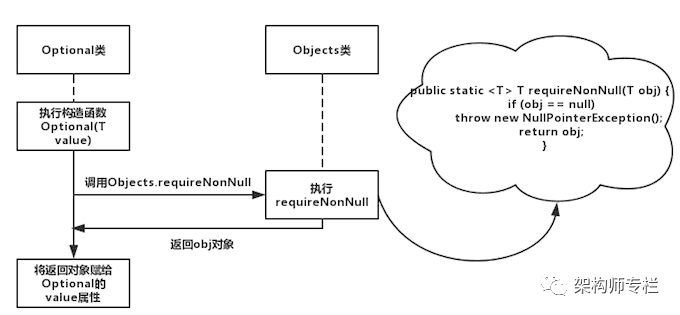在文章的开头,先说下NPE问题,NPE问题就是,我们在开发中经常碰到的NullPointerException.假设我们有两个类,他们的UML类图如下图所示
在这种情况下,有如下代码
user.getAddress().getProvince();
这种写法,在user为null时,是有可能报NullPointerException异常的。为了解决这个问题,于是采用下面的写法
注 意
文末有:3625页互联网大厂面试题
if(user!=null){Address address = user.getAddress();if(address!=null){String province = address.getProvince();}}
这种写法是比较丑陋的,为了避免上述丑陋的写法,让丑陋的设计变得优雅。JAVA8提供了Optional类来优化这种写法,接下来的正文部分进行详细说明
API介绍
先介绍一下API,与其他文章不同的是,本文采取类比的方式来讲,同时结合源码。而不像其他文章一样,一个个API罗列出来,让人找不到重点。
1、Optional(T value),empty(),of(T value),ofNullable(T value)
这四个函数之间具有相关性,因此放在一组进行记忆。
先说明一下,[Optional(T value)](https://mp.weixin.qq.com/s?__biz=MzA3MTUzOTcxOQ==&mid=2452981393&idx=2&sn=9c0005ed9e5119eef7183eb25db0edee&scene=21#wechat_redirect),即构造函数,它是private权限的,不能由外部调用的。其余三个函数是public权限,供我们所调用。那么,Optional的本质,就是内部储存了一个真实的值,在构造的时候,就直接判断其值是否为空。好吧,这么说还是比较抽象。直接上[Optional(T value)](https://mp.weixin.qq.com/s?__biz=MzA3MTUzOTcxOQ==&mid=2452981393&idx=2&sn=9c0005ed9e5119eef7183eb25db0edee&scene=21#wechat_redirect)构造函数的源码,如下图所示
那么,of(T value)的源码如下
public static <T> Optional<T> of(T value) {return new Optional<>(value);}
也就是说of(T value)函数内部调用了构造函数。根据构造函数的源码我们可以得出两个结论:
- 通过
[of(T value)](https://mp.weixin.qq.com/s?__biz=MzA3MTUzOTcxOQ==&mid=2452981393&idx=2&sn=9c0005ed9e5119eef7183eb25db0edee&scene=21#wechat_redirect)函数所构造出的Optional对象,当Value值为空时,依然会报NullPointerException。 - 通过
[of(T value)](https://mp.weixin.qq.com/s?__biz=MzA3MTUzOTcxOQ==&mid=2452981393&idx=2&sn=9c0005ed9e5119eef7183eb25db0edee&scene=21#wechat_redirect)函数所构造出的Optional对象,当Value值不为空时,能正常构造Optional对象。
除此之外呢,Optional类内部还维护一个value为null的对象,大概就是长下面这样的
public final class Optional<T> {//省略....private static final Optional<?> EMPTY = new Optional<>();private Optional() {this.value = null;}//省略...public static<T> Optional<T> empty() {@SuppressWarnings("unchecked")Optional<T> t = (Optional<T>) EMPTY;return t;}}
那么,empty()的作用就是返回EMPTY对象。
好了铺垫了这么多,可以说ofNullable(T value)的作用了,上源码
public static <T> Optional<T> ofNullable(T value) {return value == null ? empty() : of(value);}
好吧,大家应该都看得懂什么意思了。相比较[of(T value)](https://mp.weixin.qq.com/s?__biz=MzA3MTUzOTcxOQ==&mid=2452981393&idx=2&sn=9c0005ed9e5119eef7183eb25db0edee&scene=21#wechat_redirect)的区别就是,当value值为null时,of(T value)会报NullPointerException异常;[ofNullable(T value)](https://mp.weixin.qq.com/s?__biz=MzA3MTUzOTcxOQ==&mid=2452981393&idx=2&sn=9c0005ed9e5119eef7183eb25db0edee&scene=21#wechat_redirect)不会throw Exception,[ofNullable(T value)](https://mp.weixin.qq.com/s?__biz=MzA3MTUzOTcxOQ==&mid=2452981393&idx=2&sn=9c0005ed9e5119eef7183eb25db0edee&scene=21#wechat_redirect)直接返回一个[EMPTY](https://mp.weixin.qq.com/s?__biz=MzA3MTUzOTcxOQ==&mid=2452981393&idx=2&sn=9c0005ed9e5119eef7183eb25db0edee&scene=21#wechat_redirect)对象。
那是不是意味着,我们在项目中只用[ofNullable](https://mp.weixin.qq.com/s?__biz=MzA3MTUzOTcxOQ==&mid=2452981393&idx=2&sn=9c0005ed9e5119eef7183eb25db0edee&scene=21#wechat_redirect)函数而不用of函数呢?
不是的,一个东西存在那么自然有存在的价值。当我们在运行过程中,不想隐藏[NullPointerException](https://mp.weixin.qq.com/s?__biz=MzA3MTUzOTcxOQ==&mid=2452981393&idx=2&sn=9c0005ed9e5119eef7183eb25db0edee&scene=21#wechat_redirect)。而是要立即报告,这种情况下就用Of函数。但是不得不承认,这样的场景真的很少。博主也仅在写junit测试用例中用到过此函数。另外关注:架构师专栏,在后台回复:“面试题”可以获取,高清PDF最新版3625页互联网大厂面试题。
2、orElse(T other),orElseGet(Supplier<? extends T> other)和orElseThrow(Supplier<? extends X> exceptionSupplier)
这三个函数放一组进行记忆,都是在构造函数传入的value值为null时,进行调用的。[orElse](https://mp.weixin.qq.com/s?__biz=MzA3MTUzOTcxOQ==&mid=2452981393&idx=2&sn=9c0005ed9e5119eef7183eb25db0edee&scene=21#wechat_redirect)和[orElseGet](https://mp.weixin.qq.com/s?__biz=MzA3MTUzOTcxOQ==&mid=2452981393&idx=2&sn=9c0005ed9e5119eef7183eb25db0edee&scene=21#wechat_redirect)的用法如下所示,相当于value值为null时,给予一个默认值:
@Testpublic void test() {User user = null;user = Optional.ofNullable(user).orElse(createUser());user = Optional.ofNullable(user).orElseGet(() -> createUser());}public User createUser(){User user = new User();user.setName("zhangsan");return user;}
这两个函数的区别:当user值不为null时,[orElse](https://mp.weixin.qq.com/s?__biz=MzA3MTUzOTcxOQ==&mid=2452981393&idx=2&sn=9c0005ed9e5119eef7183eb25db0edee&scene=21#wechat_redirect)函数依然会执行createUser()方法,而[orElseGet](https://mp.weixin.qq.com/s?__biz=MzA3MTUzOTcxOQ==&mid=2452981393&idx=2&sn=9c0005ed9e5119eef7183eb25db0edee&scene=21#wechat_redirect)函数并不会执行createUser()方法,大家可自行测试。
至于orElseThrow,就是value值为null时,直接抛一个异常出去,用法如下所示
User user = null;Optional.ofNullable(user).orElseThrow(()->new Exception("用户不存在"));
3、[map(Function<? super T, ? extends U> mapper)和flatMap(Function<? super T, Optional<U>> mapper)](https://mp.weixin.qq.com/s?__biz=MzA3MTUzOTcxOQ==&mid=2452981393&idx=2&sn=9c0005ed9e5119eef7183eb25db0edee&scene=21#wechat_redirect)
这两个函数放在一组记忆,这两个函数做的是转换值的操作。
直接上源码
public final class Optional<T> {//省略....public<U> Optional<U> map(Function<? super T, ? extends U> mapper) {Objects.requireNonNull(mapper);if (!isPresent())return empty();else {return Optional.ofNullable(mapper.apply(value));}}//省略...public<U> Optional<U> flatMap(Function<? super T, Optional<U>> mapper) {Objects.requireNonNull(mapper);if (!isPresent())return empty();else {return Objects.requireNonNull(mapper.apply(value));}}}
这两个函数,在函数体上没什么区别。唯一区别的就是入参,map函数所接受的入参类型为[Function<? super T, ? extends U>](https://mp.weixin.qq.com/s?__biz=MzA3MTUzOTcxOQ==&mid=2452981393&idx=2&sn=9c0005ed9e5119eef7183eb25db0edee&scene=21#wechat_redirect),而flapMap的入参类型为[Function<? super T, Optional<U>>](https://mp.weixin.qq.com/s?__biz=MzA3MTUzOTcxOQ==&mid=2452981393&idx=2&sn=9c0005ed9e5119eef7183eb25db0edee&scene=21#wechat_redirect)。
在具体用法上,对于map而言:
如果User结构是下面这样的
public class User {private String name;public String getName() {return name;}}
这时候取name的写法如下所示
String city = Optional.ofNullable(user).map(u-> u.getName()).get();
对于flatMap而言:
如果User结构是下面这样的
public class User {private String name;public Optional<String> getName() {return Optional.ofNullable(name);}}
这时候取name的写法如下所示
String city = Optional.ofNullable(user).flatMap(u-> u.getName()).get();
4、isPresent()和ifPresent(Consumer<? super T> consumer)
这两个函数放在一起记忆,[isPresent](https://mp.weixin.qq.com/s?__biz=MzA3MTUzOTcxOQ==&mid=2452981393&idx=2&sn=9c0005ed9e5119eef7183eb25db0edee&scene=21#wechat_redirect)即判断value值是否为空,而[ifPresent](https://mp.weixin.qq.com/s?__biz=MzA3MTUzOTcxOQ==&mid=2452981393&idx=2&sn=9c0005ed9e5119eef7183eb25db0edee&scene=21#wechat_redirect)就是在value值不为空时,做一些操作。这两个函数的源码如下
public final class Optional<T> {//省略....public boolean isPresent() {return value != null;}//省略...public void ifPresent(Consumer<? super T> consumer) {if (value != null)consumer.accept(value);}}
需要额外说明的是,大家千万不要把
if (user != null){// TODO: do something}
给写成
User user = Optional.ofNullable(user);if (Optional.isPresent()){// TODO: do something}
因为这样写,代码结构依然丑陋。博主会在后面给出正确写法
至于[ifPresent(Consumer<? super T> consumer)](https://mp.weixin.qq.com/s?__biz=MzA3MTUzOTcxOQ==&mid=2452981393&idx=2&sn=9c0005ed9e5119eef7183eb25db0edee&scene=21#wechat_redirect),用法也很简单,如下所示
Optional.ofNullable(user).ifPresent(u->{// TODO: do something});
5、filter(Predicate<? super T> predicate)
不多说,直接上源码
public final class Optional<T> {//省略....Objects.requireNonNull(predicate);if (!isPresent())return this;elsereturn predicate.test(value) ? this : empty();}
filter 方法接受一个 [Predicate](https://mp.weixin.qq.com/s?__biz=MzA3MTUzOTcxOQ==&mid=2452981393&idx=2&sn=9c0005ed9e5119eef7183eb25db0edee&scene=21#wechat_redirect) 来对 [Optional](https://mp.weixin.qq.com/s?__biz=MzA3MTUzOTcxOQ==&mid=2452981393&idx=2&sn=9c0005ed9e5119eef7183eb25db0edee&scene=21#wechat_redirect) 中包含的值进行过滤,如果包含的值满足条件,那么还是返回这个 Optional;否则返回 [Optional.empty](https://mp.weixin.qq.com/s?__biz=MzA3MTUzOTcxOQ==&mid=2452981393&idx=2&sn=9c0005ed9e5119eef7183eb25db0edee&scene=21#wechat_redirect)。
用法如下
Optional<User> user1 = Optional.ofNullable(user).filter(u -> u.getName().length()<6);
如上所示,如果user的name的长度是小于6的,则返回。如果是大于6的,则返回一个EMPTY对象。
实战使用
例一
在函数方法中
以前写法
public String getCity(User user) throws Exception{if(user!=null){if(user.getAddress()!=null){Address address = user.getAddress();if(address.getCity()!=null){return address.getCity();}}}throw new Excpetion("取值错误");}
JAVA8写法
public String getCity(User user) throws Exception{return Optional.ofNullable(user).map(u-> u.getAddress()).map(a->a.getCity()).orElseThrow(()->new Exception("取指错误"));}
例二
比如,在主程序中
以前写法
if(user!=null){dosomething(user);}
JAVA8写法
Optional.ofNullable(user).ifPresent(u->{dosomething(u);});
例三
以前写法
public User getUser(User user) throws Exception{if(user!=null){String name = user.getName();if("zhangsan".equals(name)){return user;}}else{user = new User();user.setName("zhangsan");return user;}}
java8写法
public User getUser(User user) {return Optional.ofNullable(user).filter(u->"zhangsan".equals(u.getName())).orElseGet(()-> {User user1 = new User();user1.setName("zhangsan");return user1;});}

